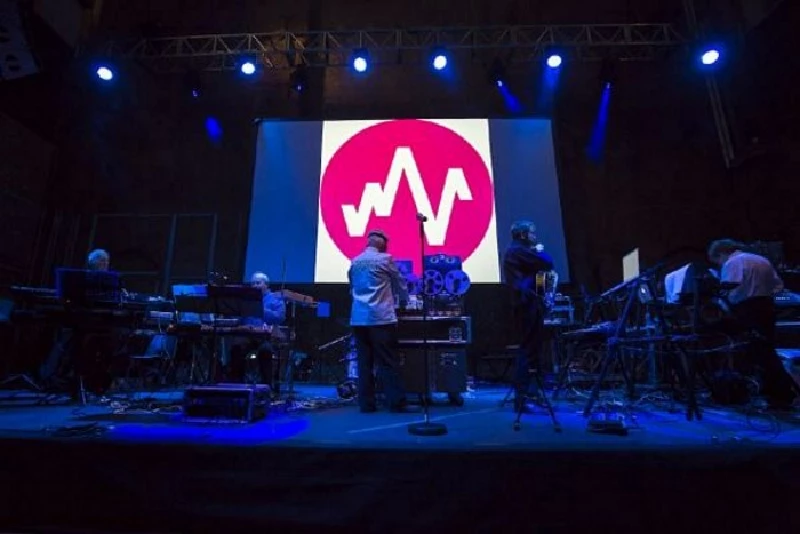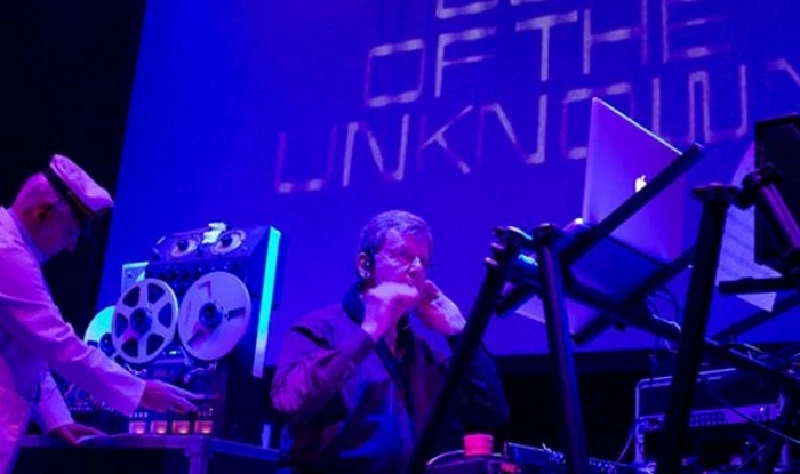Radiophonic Workshop - Science Museum, London, 26/6/2017
by Chris O'Toole
published: 30 / 6 / 2017

intro
Chris O'Toole at the Science Museum in London enjoys a night of archival sound effects and TV programme soundtracks from the BBC Radiophonic Workshop
You know you’re in for a highbrow evening when the night begins with a talk on the mathematics of tonality. But when you consider this is the Science Museum on a Friday night and the main draw is a performance by the Radiophonic Workshop, it all makes sense. The initial talk was an introduction to a new programme called ‘MorpheuS’, where the rules of melodic key are thrown out the window. “You can play anything and it sounds unlistenable,” might be a strange concept, but this is about how sounds and melodic key are made. It’s a way of stretching the melodic key to breaking point (or introducing a lack of breaking point) by allowing the notes to jump in octaves, unrestricted by form. Apparently. Next up was a question and answer session with four important figures in the history of the Radiophonic Workshop - Peter Howell, Roger Limb, Paddy Kingsland and long-time collaborator and honorary member Mark Ayers; names familiar with the Radiophonic Workshop and, of course, ‘Doctor Who’. Ayers is still involved with the world of the Gallifreyan Doctor; apart from scoring the music to 1989 classic ‘Ghost Light’, he’s still tidying up the soundtracks of old episodes to allow them to breathe and sparkle for modern audiences on reissued DVDs. What a charming and thoroughly British discussion it was. All four members reminisced about the creation of the Radiophonic Workshop and their place in its rich history, telling anecdotes about how they created these ethereal and mesmerising sounds and the challenges they faced using the technology of the time, mainly primitive oscillators and by cutting up tape. The sheer inventiveness they were forced to pull out of themselves to make these works happen for TV and radio really shines through. One could almost believe that before walking into the IMAX cinema that there would be huge spools of tape and synthesizers the size of Marlon Brando’s refrigerator. Instead we were greeted by several head-high banks of synthesizers, two guitars and drums. During the talk, it was mentioned how then current musical trends and styles influenced their music making; it wasn’t just men and women in lab coats. Leather jackets, electric guitars and moustaches also had their place within the confines of the cramped BBC studios. After a short intermission and hilarious pre-filmed introduction by Radiophonic Workshop member Dr Dick Mills, the music began; the gurgle and churn of synthesizers. Nick Mason-esque drum fills and screaming guitars ripped through the air as our eyes were bombarded with ‘cut-up’ archival footage from BBC shows including ‘Panorama’ (documentaries on Pablo Picasso and NASA’s first space walks) and ‘Horizon’, to the surreal scene in ‘The Hitchhiker’s Guide to the Galaxy’ where Ford Prefect is turned into a penguin. If a musical comparison could be made with anyone, the closest that comes to mind is ‘Dark Side’-era Pink Floyd, a band that were undoubtedly paying attention to what the Radiophonic Workshop were doing at the time. They might have been playing music composed during the last 50+ years (including a mind blowing ten minute jam based on their current album and first new released music since 1985 –‘ Burials in Several Earths’), but it still sounds as scintillating and terrifying today as it must have to viewers and listeners at the time. There is of course only one way to end the show – the ‘Doctor Who’ theme; being transported back in time to a junkyard in 1963 as two school teachers are kidnapped by a peculiar and menacing old man and his unwilling granddaughter. The combination of Ron Grainer’s melody and Delia Derbyshire’s genius can still terrify and mesmerize in a way that Murray Gold’s orchestra-saturated covers will never be able to emulate. This was a show that looked back to a different time, a different BBC, a different world; a place overtaken by the rapid developments of art, science and politics, one which seemed perilous yet strangely optimistic. The music they made was timeless but it’s that timelessness that means this music remains as vital and ground breaking today as it did all those years ago emanating from the cramped studios of BBC Television Centre.
Band Links:-
https://en.wikipedia.org/wiki/BBC_Radiophonic_Workshophttps://en-gb.facebook.com/theradiophonicworkshop/
https://twitter.com/radiophonicwork
Picture Gallery:-

most viewed articles
current edition
Peter Doherty - Blackheath Halls, Blackheath and Palace Halls, Watford, 18/3/2025 and 21/3/2025Armory Show - Interview with Richard Jobson
Liz Mitchell - Interview
Lauren Mayberry - Photoscapes
Deb Googe and Cara Tivey - Interview
Max Bianco and the BlueHearts - Troubadour, London, 29/3/2025
Garfunkel and Garfunkel Jr. - Interview
Sukie Smith - Interview
Maarten Schiethart - Vinyl Stories
Clive Langer - Interview
previous editions
Heavenly - P.U.N.K. Girl EPBoomtown Rats - Ten Songs That Made Me Love....
Trudie Myerscough-Harris - Interview
Doris Brendel - Interview
Beautiful South - Ten Songs That Made Me Love...
Dwina Gibb - Interview
Pulp - Ten Songs That Made Me Love...
Kay Russell - Interview with Kay Russell
Sound - Interview with Bi Marshall Part 1
Barrie Barlow - Interview
most viewed reviews
current edition
Davey Woodward - Mumbo in the JumboNigel Stonier - Wolf Notes
Wings - Venus and Mars
Kate Daisy Grant and Nick Pynn - Songs For The Trees
Only Child - Holy Ghosts
Neil Campbell - The Turnaround
Philip Jeays - Victoria
Darkness - Dreams On Toast
Suzanne Vega - Flying With Angels
Charles Ellsworth - Cosmic Cannon Fodder
Pennyblackmusic Regular Contributors
Adrian Janes
Amanda J. Window
Andrew Twambley
Anthony Dhanendran
Benjamin Howarth
Cila Warncke
Daniel Cressey
Darren Aston
Dastardly
Dave Goodwin
Denzil Watson
Dominic B. Simpson
Eoghan Lyng
Fiona Hutchings
Harry Sherriff
Helen Tipping
Jamie Rowland
John Clarkson
Julie Cruickshank
Kimberly Bright
Lisa Torem
Maarten Schiethart